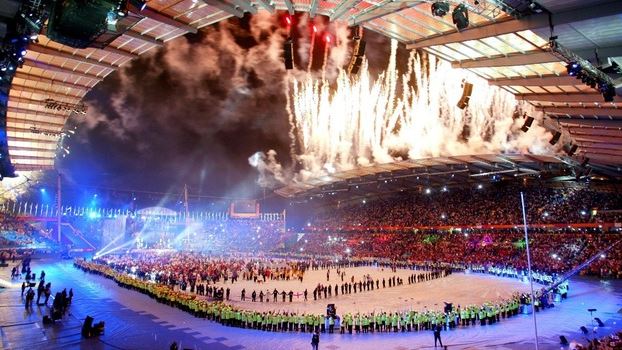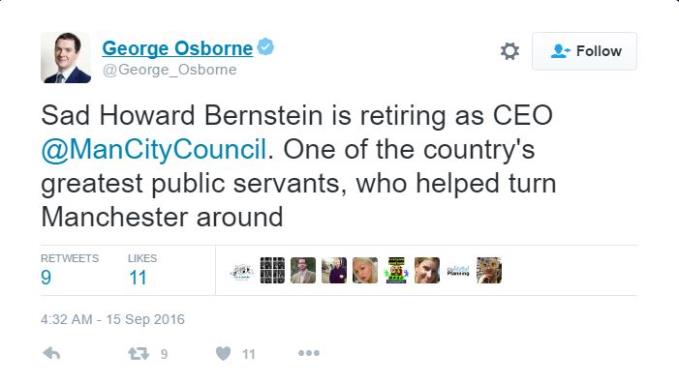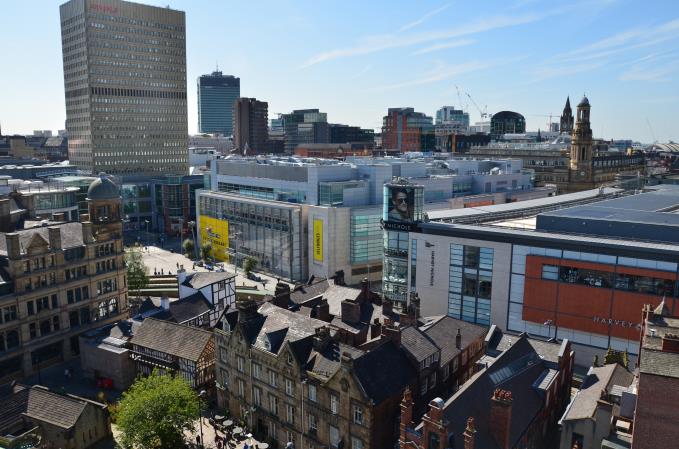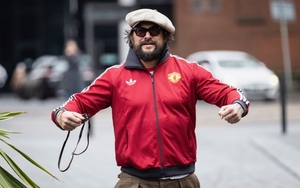SIR Howard Bernstein – the council chief executive who rose from a lowly junior clerk in 1971 to become the visionary who would change the fortunes and face of Manchester – has announced his retirement.
But what could yet prove to be Bernstein’s lasting legacy is his mission to retake power from Whitehall, to reclaim the city
Raised in Cheetham Hill, Bernstein, 63, started out in Manchester Town Hall in 1971, quickly rising to the roles of policy planner and deputy clerk.
It was from 1996 – in the aftermath of the IRA attack on Manchester – that Bernstein really proved his mettle, leading the transformation of the city centre as the chief executive of Manchester Millenium Ltd.
Six years after the bomb, Bernstein would again play a pivotal role in the regeneration of the city, overseeing Manchester’s hosting of the 2002 Commonwealth Games – then the largest multi-sport event held in the UK since the 1948 Olympics – which proved a major catalyst in the continued development of the now thriving East Manchester, which had been one of the most deprived areas in the country.
Bernstein - renowned for a savvy business acumen which brought billions of pounds of investment into the city - also had a major hand in the development of Manchester’s transport network, playing a leading role in the expansion of the Metrolink and Manchester Airport.
But what could prove to be Bernstein’s lasting legacy is his mission to retake power from Whitehall, to reclaim the city via ‘DevoManc’ and direct the unprecedented transfer of budgets northwards.
In November 2014, Bernstein – working in close partnership with Chancellor George Osborne and alongside Manchester Council leader Sir Richard Leese – had his wish, securing roughly £1bn worth of control over transport, planning, housing and education, in exchange for a Boris-brand elected mayor (who will take their seat next year).
By February 2015, Bernstein and Leese had outdone themselves, negotiated control of Greater Manchester’s £6bn NHS budget – the first local authority in England to do so – with eyes on control over all £22bn of public spending in the region (though that now seems unlikely given Osborne's departure and Theresa May's clear doubts over devolution and the 'Northern Powerhouse').
 Bernstein played a major hand in securing the 2002 Commonwealth Games
Bernstein played a major hand in securing the 2002 Commonwealth GamesIn fact, there are very few major city projects, initiatives and investments that Bernstein hasn't had a hand in: Spinningfields, Airport City, NOMA, Manchester Life, Northern Hub, St John's, HS2, HS3, MediaCityUK, The Factory, Bridgewater Hall, First Street, the Arena, Graphene, the Sir Henry Royce Institute, Urbis and, yes, even Piccadilly Gardens (which he called an 'undoubted success')... we'll let that one slide.
"Howard's impact on every aspect of this city's development has been profound, and his articulation of the role of cities in leading economic growth has influenced governments and policy-makers nationally and internationally," says Bruntwood CEO, Chris Oglesby. "His legacy is all around us, in decades of successful regeneration projects and infrastructure investment.
Sir Howard, who was knighted in 2003 for his services to the city, said: “It has been a privilege to serve the city during such a pivotal period, working with many excellent people both within the council and in public and private partner organisations. I’m incredibly proud of what the city has been able to achieve in this time and to have played a part in it.
“Manchester is firmly established as a confident and dynamic place, recognised as a premier league world city although of course there are still significant challenges to address to ensure everyone who live here has the opportunity to share in, and contribute to, its growing success.
“We have a clear, shared vision for the future direction of the city – set out in the Our Manchester Strategy which takes the city up to 2025– and a strong platform from which to move forwards. But by definition this is a long-term strategy. I will have been at the Council 46 years next year and this feels like the right time to plan for my succession. There is still considerable work to do in the months ahead and my focus on it will not be diminished.“Manchester is firmly established as a confident and dynamic place, recognised as a premier league world city although of course there are still significant challenges to address to ensure everyone who live here has the opportunity to share in, and contribute to, its growing success.
 Former Chancellor George Osborne responds to the news
Former Chancellor George Osborne responds to the news Bernstein oversaw the regeneration of the city centre following the 1996 IRA bomb
Bernstein oversaw the regeneration of the city centre following the 1996 IRA bombSir Richard Leese, Leader of Manchester City Council, said: “Sir Howard is widely recognised as one of the great local government chief executives. Having someone of his talent, vision and drive dedicate his career to the city has been an undoubted plus for Manchester. Working with him over many years, addressing challenges and attempting to capture opportunities for the city, has been a pleasure.
“He will be a hard act to follow but part of his legacy will be the quality of the team, the strength of relationships and the depth of organisational ambition his successor inherits.
“Our new chief executive will need to be someone with the strategic vision, innovative ideas, partnership working skills and gravitas to help lead Manchester forwards into an exciting new phase.”
As the government's commitment to devolution and the 'Northern Powerhouse' wavers, questions may be raised over the timing of Bernstein's departure. But few can argue that without Bernstein, Manchester would not be the globally important city it is today.
For the incoming chief executive, those are some mighty shoes (and perhaps a scarf) to fill.
 Powered by Wakelet
Powered by Wakelet












